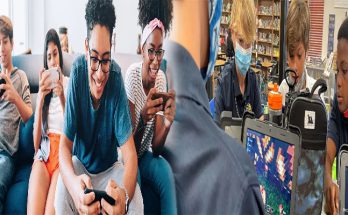Adaptive game-based learning is a dynamic approach to education that uses technology and gaming mechanics to personalize learning and promote progression among teen learners. This innovative approach to learning integrates games, simulations, and other interactive elements to adapt lessons to the needs and preferences of individual learners, maximizing engagement, and learning outcomes. In this article, we will explore the benefits and potential of adaptive game-based learning for teen individualization and progression.
What Is Adaptive Game-Based Learning?
Adaptive learning is an approach to education that adapts and personalizes the learning experience to the needs and preferences of individual learners. This personalized approach to learning allows teens to receive instruction and feedback that is tailored to their unique learning styles, progress, and goals. The combination of adaptive learning and game-based learning creates a powerful and effective learning experience that is both engaging and educational.
Adaptive game-based learning offers the following benefits:
- Personalization: Adaptive game-based learning allows teens to learn at their own pace and style, tailoring instruction to their individual needs and preferences.
- Engagement: By integrating gaming mechanics into learning, teens are more motivated and engaged, leading to increased learning outcomes and progression.
- Feedback: Adaptive game-based learning provides immediate feedback to teens, improving their learning outcomes and helping them understand their strengths and weaknesses.
- Flexibility: Adaptive game-based learning offers the flexibility to adapt lessons to the specific learning objectives and goals of individual learners.
How Does Adaptive Game-Based Learning Work?
Adaptive game-based learning uses technology and gaming mechanics to deliver personalized, interactive, and engaging learning experiences to teens. By leveraging data analytics and artificial intelligence, adaptive game-based learning adjusts the complexity, difficulty, and pacing of the learning experience based on the learner’s performance, preferences, and progress.
Adaptive game-based learning uses several techniques to personalize learning experiences, including:
- Leveling-Up: Adaptive game-based learning allows learners to progress at their own pace, complete challenges, and earn rewards as they master new skills and concepts.
- Simulation-Based Learning: Simulations can provide immersive and realistic scenarios that require learners to make decisions and solve problems, leading to meaningful learning outcomes.
- Personalized Feedback: Personalized feedback on learners’ strengths, weaknesses, and progress can be provided in real-time, leading to increased engagement and learning outcomes.
Benefits of Adaptive Game-Based Learning
Adaptive game-based learning provides several benefits for learners, including:
- Improved Progress and Learning Outcomes: Adaptive game-based learning personalizes instruction and feedback to the unique needs and preferences of individual learners, leading to better retention of knowledge and skills.
- Engagement and Motivation: By integrating play and gaming mechanics into learning, adaptive game-based learning increases motivation and engagement among learners, leading to increased learning outcomes.
- Individualization and Flexibility: Adaptive game-based learning allows learners to progress at their own pace and provides personalized instruction tailored to their strengths, weaknesses, and goals.
- Data-Driven Decision-Making: Adaptive game-based learning leverages data-driven insights and analytics to refine instruction and personalize the learning experience, leading to improved outcomes and progress.
Examples of Adaptive Game-Based Learning Programs for Teenagers
Several adaptive game-based learning programs are available that are specifically designed to promote individualization and progression among teenage learners. These include:
- Khan Academy: Khan Academy is an online learning platform that offers personalized instruction in math, science, and other subjects, using adaptive game-based learning and gamification mechanics.
- Amplify: Amplify is a platform that offers personalized instruction for K-12 students, including games and simulations that teach various subjects.
- Edmentum: Edmentum offers several adaptive game-based learning programs that are designed for K-12 and adult learners, including math, science, language arts, and reading.
Adaptive game-based learning provides a powerful and innovative approach to education that promotes individualization and progression among teen learners. By integrating games, simulations, and other interactive elements with personalized instruction and feedback, adaptive game-based learning can increase engagement, motivation, and learning outcomes among teenagers, leading to improved educational outcomes and success.





